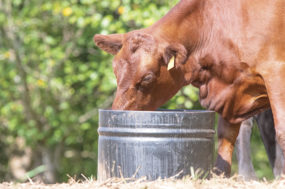The findings that come as a result of the plan will add to the significant amount of data that already exists for Zilmax (Zm) including numerous animal safety and well-being trials. The product is a feed supplement approved by the FDA and other regulatory authorities. While considerable progress has been made, the company says it is too early to determine when it will return Zm back to the market in the U.S. and Canada.
Formed in August, the advisory board is comprised of representatives from packers, large, medium and small cattle feeder operations, cow-calf producers, veterinarians, academia and industry consultants. In addition to helping the company maintain an open dialogue on animal well-being, beta agonist use and related matters, the objectives of the board include:
- Review all available animal safety and well-being research data on Zm
- Review the existing Zm Quality Assurance program (ZQA) and make recommendations, as needed
- Provide input on the certification and scientific audit processes
- Review and provide guidance on best management practices for using Zm
The advisory board has provided input on, reviewed and approved all initiatives in support of the plan. To help further ensure safe and effective product use by customers, a formal certification process has been developed. As part of the certification, every feedyard team member, nutritionist and veterinarian who uses the Zm or provides consultative services on feeding it to cattle must be trained annually on the proper use of the product.
The training will focus on safety practices, product handling, mixing protocols, cattle management, product inventory, record keeping and clean-out procedures. Every certified operation will also be required to pass an initial homogeneity test to ensure proper mixing practices, as well as four additional feed mix tests throughout the year. Before a feedyard can participate in the Zilmax Field Evaluations, the operation will need to be certified.
In addition to implementing the certification process, the company has worked with its advisory board to develop and finalize the protocol for the field evaluations for Zm-fed and control cattle (previously noted as "scientific audit"), which are expected to begin in Q1 2014.
- Observing cattle throughout the system – before and after receiving Zm – at the feedyard and at the packing plant
- Evaluating the mobility of cattle by trained third-party experts utilizing an established mobility scoring system
- Reviewing potential compounding factors, such as nutrition, transportation, receiving facilities, flooring surfaces, and cattle management and handling practices
The field evaluations will take place with the oversight of a well-known independent epidemiologist and veterinarian, who will serve as principal investigator and collect all data, analyze results and publicly communicate findings in support of the company's commitment to transparency and communication.
"We at Merck Animal Health remain highly confident in the safety of Zilmax, which is supported by the results of more than 30 studies, totaling 65,000 cattle that were conducted by well-respected universities and third-party experts," says KJ Varma, BVSc, Ph.D., senior vice president of Merck’s Global R&D.
"We believe the field evaluations we are conducting as part of the five-step plan will support the results of previous studies and the safety of the product, and we are confident that they will help create a greater understanding of the best management practices that are so vital to helping ensure the well-being of cattle."
For safety information, refer to product label and the Zm website. ![]()
—From Merck Animal Health news release






